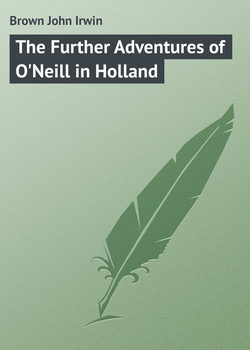Читать книгу The Further Adventures of O'Neill in Holland - Brown John Irwin - Страница 6
CHAPTER VI
THE GRAMMATICAL CARESS
Оглавление“You saved life with that Boyton-Grammar of yours, if I catch the drift of your last remark?” interposed the Professor magniloquently, as if he were addressing a public meeting.
“May I hazard the guess that Boyton on that occasion was rather a weapon of offence than of defence?”
“Well, you’re right,” said O’Neill. “Offence is more in Boyton’s line. And he certainly did press heavily, that day, on a butcher’s boy. You remember those slagersjongens that saunter about, in white linen coats, with great protruding baskets on their shoulders. They jostle and push wherever they have a chance, and whirl round with their cargoes of meat, so as to make you start. You know the tribe. Well, Boyton proved an admirable corrective to the insolence of one of these imps.
A HAPPY CROWD
It was a day there was a sort of festival in the Hague.
From early in the afternoon there was a crush everywhere. The singels and the main roads through the Wood were filled with holiday-makers. Soldiers were parading here and there. Everyone was in the best of good humour; music in the distance rose and fell on the air; flags fluttered from the windows. Look where you might, there were bright dresses, prancing horses, snorting motors, and pedestrians of all descriptions.
I was one of the pedestrians.
I had been at my grammar in the morning; and after a long spell in the house had stepped over to Enderby’s, and coaxed that lazy fellow out for a stroll. It was perfect weather, and the crowds were wonderfully well-behaved. We enjoyed ourselves finely ‘under the green-wood tree,’ till we were brought to a stand-still in a dense mass of humanity that was packed along the edge of a canal, scarcely moving. A procession or something had impeded the traffic some moments.
INNOCENCE IN DANGER
There was a knot of butchers’ boys right in front of us. They were roughly shoving their neighbours about, and seeing what mischief they could do. Horse play, in fact. They didn’t seem to fit into Boyton’s categories, either of ‘Natives intelligent’ or ‘polite’.
Presently one brawny scoundrel began to throw stones at the occupants of a carriage that was slowly passing by.
I couldn’t believe my eyes!
There sat an old lady of eighty or ninety, with soft white hair – the very picture of fragility; opposite her was a nurse in dark uniform, in charge of three dainty little children in pink and white – mere babies of three or four – with innocent blue eyes gazing all round them. And, actually, that ruffianly knecht was about to bombard the group with whatever he had in his hand!
Bang went a big mass of something – presumably hard, from the rattle it made – against the side of the carriage.
Happily he was a poor marksman, that rascally slager; for at that short range he ought to have been able to demolish so fragile an old lady at the first shot, or at the very least have put out one eye.
As it was, he only knocked off her bonnet.
Enraged, apparently, at his poor practice at a practically stationary target so close at hand, he picked up another half-brick and wheeled, to take more deliberate aim.
The delicate old lady grew pale, and spasmodically fumbled with her parasol to shield the children.
NEMESIS
I thought her eye caught mine; and, seeing there was no escape for her unless I interposed – no one till now seemed to have noticed the occurrence – I shouted, “Stop, slager, stop!” and whisked Boyton’s learned pages right into his face, taking care at the same moment to administer a vigorous push to the long arm of the lever conveniently made by his basket.
This forced him to revolve suddenly on his own axis – beefsteak and all; and, as he spun round, I accelerated his motion with a pat or two from the ‘compendium’. It was all the work of an instant, and executed just in time. The grammatical caress foiled his aim completely, and he flung his missile blindly in the wrong direction.
As I slipped unostentatiously into the crowd out of the immediate neighbourhood of the discomfited marksman, I had the satisfaction of seeing the dear old lady recover colour and smile. The babies crowed with delight, and clapped their hands. They thought it was a game got up for their special benefit!
THE OUTCOME OF A REVOLUTION
I raised my hat and retired, a warm glow of self-approval in my breast, and on my lips an involuntary quotation from Boyton: “De spraakkunst is voor iedereen onmisbaar.”
Meantime the brickbat fell harmlessly on the back of a policeman who, with hands tightly clasped behind him, was studying a bed of scarlet geraniums.
He never even turned, but only said “Ja, ja,” over his shoulder!
Two days after this adventure my eye caught the following paragraph among the advertisements in the Nieuwe Courant:
“Stop, Slager, stop!”
The Baroness X. and her three grandchildren herewith beg heartily to thank the young Englishman for his gallant conduct in the Wood, on the 31st Ultimo.
